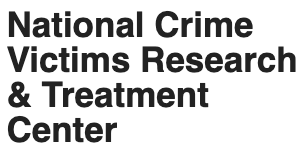The National Crime Victims Research and Treatment Center (NCVC) was established in 1977 and has achieved an international reputation for its innovative research, education and training, evidence-based mental health treatment, prevention services, collaboration with victim service agencies, and consultation with public policy makers.
Our Mission
- Advancing scientific and public understanding of the scope, nature, and mental health impact of exposure to crime and other traumatic events.
- Improving the mental health of victims of crime and other traumatic events through research, education, prevention, treatment, public policy consultation, and collaboration.
Our Clinical Services
The NCVC offers a variety of specialized, evidence-based assessment, intervention, and treatment services to adult and child victims of violent crime and their families, as well as to victims of other forms of traumatic events, such as automobile accidents, house fires, industrial accidents, terrorist attacks, and natural disasters.
Education & Training
The NCVC is dedicated to education and training, and we provide clinical and research training to pre-doctoral clinical psychology interns, psychiatry residents, social work interns, and post-doctoral fellows. We also provide training to other professionals at major regional, national, and international professional conferences. The NCVC has developed several extremely popular free online courses for mental health professionals that have been completed by more than 100,000 mental health professionals from all 50 states and over 100 countries.
Our Research
The NCVC conducts research focused on investigating the scope, nature, and impact of criminal victimization and other traumatic events on adults, children, and their families. The goal of this research is to identify causes and consequences of trauma and violence as well as to develop and evaluate effective therapeutic interventions for those suffering victimization-related emotional and behavioral problems.

